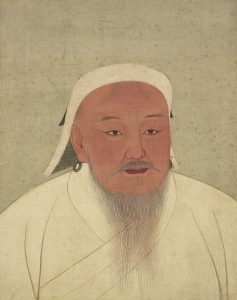The stories of Greek mythology are entirely fascinating and thought provoking. Nevertheless, these myths have become so popularized because of the teachings found within the strengths and battles of each Greek figure. The chronicled lives of Greek gods and goddesses is a compilation of oral stories that have been passed from generation to generation.1 Although these didactic stories are all intriguing, one compelling one is the upbringing of Zeus, God of the Sky and the King of the Gods. Zeus’s admiration and notorious reputation in Olympus was not an easily achieved title. He endured various struggles throughout young adulthood within himself, his family, and those who sought for control.2 Despite great obstacles, Zeus fulfilled a destiny that would lead him to reign over Olympus.

Son of Cronus and Rhea, Zeus was the last-born child of six siblings. His father, Cronus, managed to seize domination of the skies from his own father, Ouranos, and was cautious that his actions would repeat itself with his own children. To prevent a detestable takeover before his death, Cronus consumed his children Hestia, Demeter, Hera, Hades, and Poseidon. Luckily, Rhea, Cronus’s wife, spared Zeus by giving her partner a stone wrapped in a blanket.3 Assisted by Titans, Uranus and Gaea, Rhea managed to send her son to Mount Dikte, on a Greek island in Crete, so that he would be far away from his father’s tyrannical greed. Zeus was nurtured by Nymphs, or divine spirits, and was fed by Amaltheia, a goat nurse, that acquired milk for him through one of her cracked horns.4 His unknowing escape resulted in Zeus’s ignorance regarding his powers and potential ability to be the God of all Gods.

As his coming of age grew closer, Zeus’s powers became increasingly dominant, and could not go unnoticed. Since Zeus was unaware of his true beginnings, and was raised by Amaltheia, he held great adoration toward her. On one occasion, Amaltheia got trapped on a tree branch, and in her attempt to become untangled, her horn broke off. She proceeded to fill the horn with fruits and handed it over to Zeus as a keepsake of protection. To show her his appreciation, he transformed Amaltheia’s horn into a cornucopia. Symbolically, this is the “horn of plenty,” and has all the food and drink that the owner desires.5 Having the cornucopia in his possession, Zeus’s powers increased, and fruits were never scarce, becoming richer than they were before. Gaea noticed Zeus’s extraordinary powers, and she entrusted to him his fate to overthrow his father for his total rule.

Upon learning of his origins, Zeus returned to gain control of Olympus from Cronus. Initially, Zeus got his father to eat a special herb, which caused him to eject Zeus’s siblings from his stomach.6 Ungovernable Titans wanted to battle for jurisdiction over all Olympian gods, and a decade-long battle emerged, which came to be known as Titanomachy. The Titans were siblings of Cronus, and Zeus gained assistance from a cyclops. The cyclops provided Zeus with his signature lightning bolt, and Zeus’s brothers, Poseidon and Hades, managed to take supreme authority from Cronus.7 Much of Zeus’s struggles came to him when he realized that he possessed his supernatural powers. Fortunately, he instinctively chose to do what was morally right, while being able to implement his powers on others.
Ultimately, Zeus and his brothers chose to rule over distinct parts of the cosmos. Zeus secured the heavens, Poseidon ruled the seas, and Hades became lord of the underworld.8 The limitations that Cronus once wished to deprive Zeus of were no longer an obstacle. According to Homer, Zeus reigned at the top of Mount Olympus, where he observed the affairs of men.9 Zeus also married his sister, Hera, and embodied the divine dimension of the code of ethics that ancient Greeks aspired to live by. Artistically, Zeus is characterized as a bearded and honorable man. When the topic of Greek gods and mythology arises, it is typical for one to envision Zeus and his lightning bolt.
- Salem Press Encyclopedia, 2017, s.v. “Zeus(Deity),” by Trudy Mercadal. ↵
- Elaine Margery, Greek Mythology: Ancient Myths of the Gods, Goddesses, and Heroes-Zeus, Hercules and the Olympians (n.p., 2016), 30. ↵
- Russel Robert, Zeus (Hockessin, DE: Mitchell Lane Publishers, Inc., 2008), 10. ↵
- Robin Waterfield, The Greek Myths (London: Quercus, 2013), 6. ↵
- Karoly Kerenyi, The God’s of the Greeks (London: Thames and Hudson, 2006), 3. ↵
- Elaine Margery, Greek Mythology: Ancient Myths of the Gods, Goddesses, and Heroes-Zeus, Hercules and the Olympians (n.p., 2016), 23. ↵
- Russel Robert, Zeus (Hockessin, DE: Mitchell Lane Publishers, Inc., 2008), 33. ↵
- Salem Press Encyclopedia, 2017, s.v. “Zeus(Deity),” by Trudy Mercadal. ↵
- Russel Robert, Zeus (Hockessin, DE: Mitchell Lane Publishers, Inc., 2008), 15. ↵


85 comments
Alexandra Lopez
Although I have heard this story several times the author of this article kept me interested the entire time. Learning more information than I had not known before is the whole point of writing and this author succeeded in that part. This article was written unbiased but the reader can sense the admiration the author has for this subject.
Steven Hale
I really enjoyed learning about Zeus’ early years, before he was known as the most powerful god. It seems ironic that Cronus would eat his own offspring, and then Zeus would eventually have dozens of children. Maybe Zeus was more confident in his powers and thought he could not be replaced by his offspring the way Cronus was. This article also gives some insight into Ancient Greek culture; if Zeus was thought of as a moral being, then marrying a sibling must have been somewhat acceptable at the time.
Lilliana Canales
Greek mythology has always fascinated me and this article centers around the most known God of Greek mythology. Not many people know of the birth of Zeus or his early adulthood before he became the almighty Zeus and this article explains it. Personally, I enjoyed the story of how Zeus obtained power over the Earth. This is my favorite article so far and your research is appreciated.
Kathyleen Lauriano
Reading about Greek Mythology has always been interesting to me. The whole thing with Gods and Goddesses is intriguing. I think the weird thing about Zeus is that he ended up married to his sister, but That’s how it was in that time. Its great to read about how he became who he was. He could have taken control of everything and not cared about his siblings but he didn’t and that shows what kind of god he was.
Didier Cadena
This was a very fun article to read. I am really into Greek mythology, so it was nice to read an article involving it. I love the whole origin of Zeus and his rise to power, because it is so exciting. The article does a great job of putting all of the information together and still make it interesting to read.
Ethan Rodriguez
First off, I am always interested in articles revolving Greek Mythology. After reading the title and accessing most of the text, The writing style and vernacular just absolutely captivated me. I found it tough at times to conclude all of the siblings of Zeus but nonetheless I found this article interesting, I liked the way the article described Zeus and I feel that through the words, I have a new sense of understanding just who he is. This was a good article and I look forward to the next one about Poseidon.
Kacey Diaz
I like reading about Greek Mythology every now and then but I do sometimes find that there are always different variations of the same story. What I noticed about this article was that it was very straight to the point and very well organized and overall the story was very easy to read and to understand.
Emily Jensen
I really enjoyed how the author went into detail about Zeus’ parents, the Titan king and queen, as I have yet to find another article that does so. Zeus tricking Cronus to eat the herb was such a pivotal action in the tale, I would have like to see more of a story on that moment. Overall a very informative and attention-grabbing article.
Lamont Traylor
Zeus must be my favorite mythical Greek god. He is basically the god of lightning and he is the god that most people think of when they think of Greek mythology. The thing I find the most interesting about him is the story of how he had his daughter Athena. She popped out of his head and that is how she was born.
Lynsey Mott
Zeus is a story that everyone has heard, I have read the story of Zeus a long time ago, and a lot of people think that Hades is a bad guy or he is associated with Lucifer, but that’s not true, he just took over the underworld just like Zeus took over the sky. I think its interesting to know how Zeus got to where he was and that his mother saved him from getting eaten, by giving a rock to his father to eat. The story of him growing up I think, in my opinion is sad, he didn’t know his family, and grew up with people who weren’t, kind of like he was fostered until he became of age.